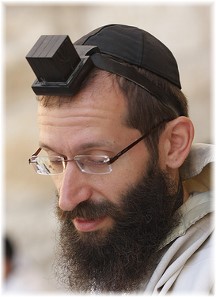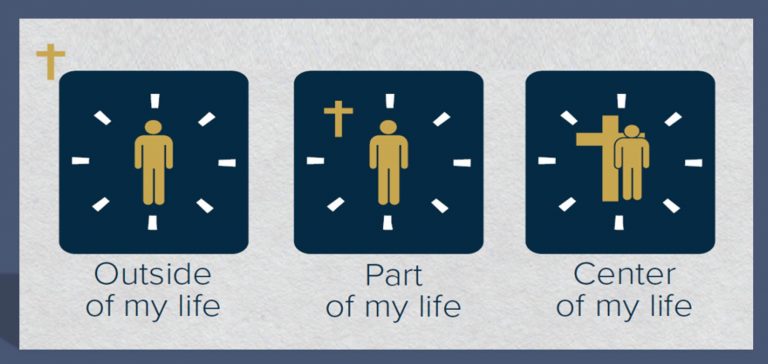In August, we shared this beautiful story of Faith Hakesley, who was sexually abused by a priest but then found healing and renewal from this meeting with Pope Benedict XVI.
Now, some people made a fair suggestion: Don’t use this story, because we’re tired of hearing about clerical abuse—I share this frustration. The reason I stuck with it was because clergy abuse, though it has decreased sharply in North America according to reports from the John Jay College for Criminal Justice in 2004 and the Center for Applied Research in the Apostolate up to 2017, it still happens, and it’s important to be vigilant about it when it’s not in the headlines, so that, when it does come up, our faith is rock solid!
I use this example because the Readings today are all about good and bad religious leaders. For Faith Hakesley, a bad priest shook her relationship with Jesus, while a good priest helped restore it.
So, is there anyone in general in our life who distracts us from Jesus? My father always talked about the hypocritical priests he knew in the Philippines, and said they were why he never believed in Jesus. Some people have mentioned how, as children, their parents would force them to go to Mass. Is there anyone in the Church that we’re letting affect our faith?
Even for me, I’ve been tempted. There’s one priest whom I find very pompous, so I don’t want to read the book he wrote, even though it’s supposed to be quite good. And there have been a few times when there are bishops preaching whose actions I don’t really respect, and so I don’t mind if I fall asleep during their homilies: ‘Lord, if you give me the gift of sleep now, Your will be done!’
Our goal today is to have a faith built on rock, and not let anyone distract us from Jesus. The Gospel says, “Then Jesus said to the crowds and to his disciples, ‘The scribes and the Pharisees sit in Moses’ chair; therefore, do whatever they teach you and follow it; but do not do as they do, for they do not practise what they teach’” (Mt 23:1-3). ‘Moses’ chair’ may be an actual seat in a synagogue or just a symbol of their authority, which Jesus acknowledges. He knows leaders are necessary. However, just as doctors can be in bad health and some psychologists crazy, so some religious leaders are corrupt. But Jesus still wants us to follow their teaching as long as it’s true, because, if we don’t follow true teachings, we’re the ones who suffer.
Then He gives three criticisms: 1) “They tie up heavy burdens, hard to bear, and lay them on the shoulders of others; but they themselves are unwilling to lift a finger to move them” (23:4). Jesus Himself gave us many obligations about prayer, the Sacraments, fasting, evangelization, and serving the poor, because obligations are helpful. Yet, they should never be used to burden people. 2) “They do all their deeds to be seen by others; for they make their phylacteries broad and their fringes long” (23:5). We know that Jesus wore fringes (Cf. Mt 9:20; 14:36; Mk 6:56; Lk 8:44), and this is what people wanted to touch in order to be healed. The Old Testament required this as a reminder to keep God’s laws (Cf. Num 15:37-39). And some scholars speculate if Jesus wore phylacteries, which are small boxes with Scripture verses inside, worn on the forehead and arm, which the Old Testament required, in order to remind people that loving God should be at the forefront of our minds and actions (Deut 6:4-8; 11:18).
- Source: Daily Encouragement Archive Edition
- Source: His Israel
So, when priests, altar servers, or choir members wear external symbols, they must be worn with the right intention, never to attract attention. 3) “They love to have the place of honour at banquets… and to have people call them rabbi. But you are not to be called rabbi, for you have one teacher, and you are all brothers and sisters. And call no one your father on earth, for you have one Father — the one in heaven” (23:6-9). What is Jesus forbidding here? Can we call our male parent ‘Dad’ but not ‘Father’? Are we simply not supposed to use the word? Are Christians allowed to have teachers and instructors but never call them such? St. Paul did so many times (Rom 4:11,16; 1 Cor 4:15; 10:1; Gal 1:14; 1 Tim 5:1; Phil 1:10), and St. John wrote to a group of men called ‘fathers’ (1 Jn 2:13). So, Jesus isn’t forbidding us from using these titles, but to remember that they denote service, not privilege. When we call a priest, ‘Father,’ we’re reminding him and us that his authority is meant to shepherd, serve, and lead us.
Since Jesus accepts and even Himself instituted religious leaders, do we ever use bad priests and scandals in the Church as excuses not to follow Him? Do we use our parents’ forcing us as children to go to Mass as an excuse not to go to Mass? When we do this, we lose out on the Eucharist, receiving forgiveness in Confession, and receiving the Church’s guidance.
Let’s look briefly at St. Paul’s priesthood in the Second Reading: “Though we might have made demands as Apostles of Christ, we were gentle among you, like a nurse tenderly caring for her own children” (1 Thess 2:7). St. Paul could have asked the Thessalonians to support him financially because Jesus said that workers deserve their wages (Lk 10:7), but he forewent this right. Instead, like a mother, he gave life to them from his own body. We see other examples of his affection for them, and then come to the main point: “We… give thanks to God for this, that when you received the word of God that you heard from us, you accepted it not as a human word but as what it really is, the word of God” (2:13). What is the heart of ‘the word of God’? Four parts: 1) That God is our Father and created us out of love so that we might be happy with Him; 2) We chose to separate ourselves from Him by our sins; 3) Jesus came to reconcile us to the Father by His life, Death and Resurrection; 4) He invites us into a relationship with Him. This is the essence of Christianity, called the Kerygma.
The Thessalonians would have accepted this word whether it came from a sinful or holy priest, because they knew from Whom it ultimately came.
Practically speaking, whenever our faith in and love for Jesus are shaken by scandals, it’s a sign that our faith and love are not strong. And get ready for the next scandal. No one wants it to happen, and we should grieve when it does, but, because humans are part of the Church, there will always be sin in the Church.
The solution is: ‘when you receive the word of God… you accept it not as a human word but as what it really is, the word of God.’ If we pray, ‘Jesus, You made me the centre of Your life. I want You to be the centre of mine,’ then nothing will shake us.
Please take a look at the Relationship Diagram.
There are three possible relationships we can have with Jesus: Outside of our life, a part of it, or the center of it. In three weeks, when we do our Christ the King Challenge, we’re asking if Jesus is King in our lives. We love all people, especially our family and then friends, but, when He’s the center, we love Him more than anyone else and make all decisions with Him in mind.
This year, we’re going to have cards in the pews so that we can circle which diagram best reflects our relationship with Jesus. This is the key to having a faith founded on rock. We’ll always come to Mass because this is where we receive Jesus in Holy Communion.
This is St. John of the Cross:
He was put in prison by his own friars and beaten by them as punishment.
This is St. Mary McKillop:
She was excommunicated by her bishop.
St. Philip Neri had his faculties to exercise priestly ministry suspended; St. Alphonsus Liguori was betrayed by his collaborators; Bl. Thérèse de Soubiran was expelled from her order; St. Francis of Assisi was voted out of office by his brothers; St. Bernadette Soubirous was verbally abused by her superior; and St. John Henry Newman was supported by few in the Church (See Fr. Vincent O’Malley, Ordinary Suffering of Extraordinary Saints).
- St. Philip Neri
- St. Alphonsus Liguori
- Bl. Thérèse de Soubiran
- St. Francis of Assisi
- St. Bernadette Soubirous
- St. John Henry Newman
All of them stayed close to Jesus and the Sacraments because they made a choice: Jesus was the centre of their lives, and no one could take it from them.












